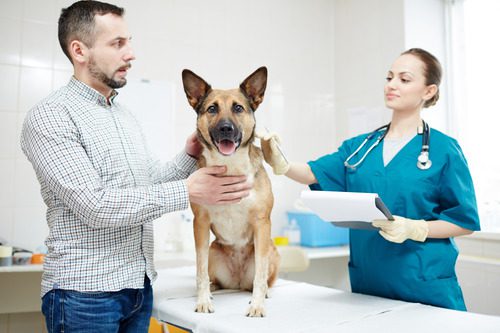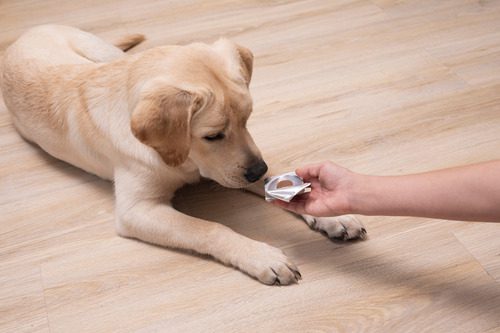Dogs may have allergies often, but some pet owners don’t know how to tell when their dog suffers from an allergy. If you think your furry friend might have some type of allergy, it’s important to learn what the warning signs are so you can take care of the problem as soon as possible.
In this article, we’ll walk you through some of the most common signs of allergies in dogs. With this information, you can make the decision to take your dog to the veterinarian or figure out how to help her deal with her allergies at home, depending on the severity and type in question.
Scratching
The most obvious way to tell your dog has an allergy in White Bear Lake, MN is that he will scratch a lot more than is normal for him. Of course, scratching can also be a sign of fleas, so it’s important to rule out this possibility before thinking your dog may have an allergy.
Part your dog’s fur and look closely at his skin to see if he has any fleas moving around on the surface. Look for any other signs of fleas as well, such as visible flea dirt in his fur. If you don’t see fleas, then some form of dog allergy is likely responsible for his scratching.
Runny eyes
Dogs who have very runny eyes may have any number of problems. They could have something wrong with their eyes, or they could even have dental pain causing their eyes to run. However, the most common cause of runny eyes in dogs is allergies.
If your dog has runny eyes that also look red or if he scratches his face trying to deal with itchy eyes often, then he probably has some form of allergy. You should take him to the veterinarian if you see anything going wrong with his eyes, however, as it could be pinkeye or a variety of other issues too.
Sneezing
Dogs sneeze for many reasons. They may sneeze because they’re happy or because they’re communicating in “dog language” to other dogs or even to human family members.
However, when a dog sneezes often and more than a few times a day, this is a sign he’s probably dealing with dog allergies in White Bear Lake, MN. Sneezing can also be a sign of upper respiratory infections and several viruses dogs are prone to catching, however, so you should take him to the vet right away if you notice him sneezing excessively.
Hives
Hives are another obvious sign of some kind of allergic reaction in your dog’s body. Dogs are not likely to develop hives for any reason other than because of allergies, but you should still take your pet to the vet if you notice hives and he has undiagnosed allergy problems.
To see hives on your pet, you will need to look closely at his skin by parting his fur. Dogs with long hair may make this more difficult than dogs with short hair, but it’s still possible; you will just need to look carefully at your dog to be sure.
Upset Stomach
An upset stomach can be a sign of all kinds of dog problems, ranging from eating something they shouldn’t have to pancreatitis and everything in-between. However, upset stomach can also be a sign of food allergies in dogs, and it’s one of the first signs many owners notice when their dogs develop allergies or intolerances to food as well.
If you think your dog might have a food allergy, take him to the veterinarian to find out more information. Upset stomach is often coupled with itchy skin and poor coat condition in dogs who have food allergies, but this is not always the case.
Circumstantial Responses
Dogs who have allergies to substances they come into contact with—either indoors or outside—have circumstantial responses to these substances or allergens. This means that dogs will only show signs of the allergy when they’re exposed to the allergen and shortly thereafter, and the problem will get better while they aren’t exposed to it.
This can be an easy way to determine whether or not your dog is dealing with this type of allergy. If you notice her improving significantly while she’s not outside but then starting to sneeze or scratch a lot after going outdoors again, this is a very good sign she has some type of allergy.
Swollen face
Dogs who have an allergic reaction to an allergen they breathe in may suffer from a swollen face and especially from a swollen snout or muzzle. This also occurs in dogs who are allergic to insect bites and stings or snake bites.
If you see this happen to your dog, pay close attention to any other symptoms she may have. This can sometimes be the first stage of anaphylaxis and will require a trip to the emergency vet in this situation. However, some dogs will simply have a swollen face and feel better soon. You know your dog best, so pay attention to her during this time and make the call as you see fit.
Allergies are very common in dogs. When you learn to recognize the signs and symptoms of some of the most common dog allergies, you can do yourself and your dog a favor by making sure you catch the problem as soon as possible.
Dogs who have allergies can easily be treated, especially when you work with your veterinarian. Your vet will give your dog steroids if necessary to reduce acute allergic reactions, and will also likely give your dog long-term allergy medication if it’s required, too.
Some dogs may be able to take Benadryl or other over-the-counter allergy medication designed for humans. However, you should never give your dog any of these medicines without your vet instructing you to do so, as too much can be extremely harmful to dogs. Your vet will be able to give you more information about human allergy medications for your pet and anything else you need to be on the lookout for when treating your dog’s allergies.
Need to talk with a veterinarian about your dog’s allergies in White Bear Lake, MN? Call Birch Lake Animal Hospital at
(651) 426-2246 today!
Recent Posts
About Birch Lake Animal Hospital
The staff at Birch Lake Animal Hospital seeks to provide the best possible medical care for our highly-valued patients and clients.






